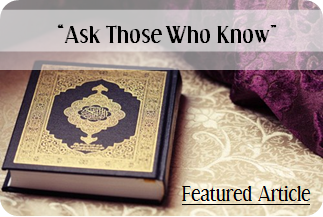


Was everything the Prophet said "Wahi" - Divinely Inspired?
This misconception has arisen due to clergy-men mis-quoting a portion of Surah An-Najm (Surah 53) out of context, which reads, "It is only an inspiration inspired in him / إِنْ هُوَ إِلا وَحْيٌ يُوحَى" in the 4th verse of the chapter.
The pronoun " It / هو " in the verse is referring to the Qur'an, most obviously. This is clear as daylight in the Qur'an. Divine inspiration or 'wahi' is not everything the prophet uttered to his people. The advocates of this erroneous interpretation suggest that the expression refers to not the Qur'an alone, but his everyday talk as a human being.
They begin from the verse before it which reads "he does not speak out of his own desire". Again, this is not referring to his human words as a man - what he said to his wives, children, and friends, but to the Qur'an. The "speech" of Muhammad as the 'messenger' is the Qur'an. We learn this from the verse:
"This is the words/speech ( qawl / قَوْل ) of an honourable messenger." (Qur'an 69:40)
The context of the verse renders it even clearer. Here is Surah An-Najm in complete form:
وَالنَّجْمِ إِذَا هَوَى
{1} By the star when it sets!
مَا ضَلَّ صَاحِبُكُمْ وَمَا غَوَى
{2} Your companion has not strayed; he is not deluded;
وَمَا يَنْطِقُ عَنِ الْهَوَى
{3} he does not speak from his own desire.
إِنْ هُوَ إِلا وَحْيٌ يُوحَى
{4} It is nothing less than a inspiration that is inspired to him
عَلَّمَهُ شَدِيدُ الْقُوَى
{5} It was taught to him by one with mighty powers,
ذُو مِرَّةٍ فَاسْتَوَى
{6} great strength, who stood
وَهُوَ بِالأُفُقِ الأَعْلَى
{7} on the highest horizon
ثُمَّ دَنَا فَتَدَلَّى
{8} and then approached––coming down
فَكَانَ قَابَ قَوْسَيْنِ أَوْ أَدْنَى
{9} until he was two bow-lengths away or even closer
فَأَوْحَى إِلَى عَبْدِهِ مَا أَوْحَى
{10} and revealed to God’s servant what He revealed.
مَا كَذَبَ الْفُؤَادُ مَا رَأَى
{11} [The Prophet’s] own heart did not distort what he saw.
أَفَتُمَارُونَهُ عَلَى مَا يَرَى
{12} Are you going to dispute with him what he saw?
Immediately after the verse, "It is only an inspiration inspired in him", notice the verse, "Taught by the one strong and mighty". Ofcourse, this verse and the verses following it are referring to the Quranic revelations! It cannot possibly refer to his daily speech - since they are discussing the angel which brought the Quranic revelations to the prophet. Thus, "he does not speak out of his own desire" is referring to the Qur'an. Anyone with slightest bit of insight can see that it is definitely not referring to the prophet's human everyday words.
The same Arabic verb 'to inspire' used in the above verse has been used elsewhere to more explicitly refer to the Qur'an, for example:
"When you do not bring them a fresh revelation, they say, ‘But can you not just ask for one?’ Say, ‘I merely repeat what is inspired to me from my Lord: this revelation brings you insights from your Lord, and guidance and mercy for those who believe, so pay attention and listen quietly when the Quran is recited, so that you may be given mercy.’ " (Qur'an 7:203-204)
This gives further evidence that in Surah An-Najm, what is being referred to by being inspired is the Qur'an itself.
Moreover, Allah does not make any mistakes. The prophet made mistakes which the Qur'an itself identifies and corrects. How can everything the prophet said be 'divine inspiration / wahi' like the Qur'an, when he made mistakes such as the occasion when the prophet ignored a blind man in favour of a more eastablished person in the world when preaching his message:
"He (the Prophet) frowned and turned away, when the blind man came to him. For all you know, he might have grown in spirit or taken note of something useful to him. But you go out of your way for the self-satisfied even though you are not to be blamed for his lack of spiritual growth! As for the one the one who has come to you full of eagerness and awe - you allow yourself to be distracted. No indeed! This [Quran] is a lesson from which those who wish to be taught should learn!" (Qur'an 80:1-12)
If the claim that everything the prophet said was divine revelation was true, then it would mean that Allah makes errors Himself! There would also be no need for the Qur'an to show the correct way to the prophet if both were like one another.
It is obvious that the prophets own words are not "wahi", and Surah An-Najm refers only to the Qur'an. Yet, these fabrications of so-called learned men are lacking in basic understanding and makes mockery of verses, so much so that a true believer who has come out of the shell wonders - what is the hidden motives and gains for these people in manufacturing this lie? This is a very important question indeed, and cannot be ignored by a sincere person. Since the Qur'an informs us of people who will "distort the Book with tongues" (3:78), true believers must therefore be on-guard against these sorts of people who are capable of manufacturing other distortions with their mouths to achieve that twisted objective.
The goal in inventing the deception is to prove that the hadith books written have divine origins, i.e. is from Allah. This is done by:
1) Attempting to prove the methods of recording the hadith is completely reliable and cannot be doubted.
2) Using Surah An-Najm to deceive ordinary people that since hadiths have divine origins and is from Allah, these books being reliable, originate from Allah too just like the Qur'an.
Therefore, they insist that the books of hadith originate from Allah, and deserves to be followed just like the Qur'an. However, when we study the Qur'an, we find that their very actions have clearly been admonished by Allah as a warning to true believers:
"Woe to those who write the Book with their own hands then Say: "This is from Allah!", so that they can make a cheap gain! Woe to them for what their hands have written, and woe to them for what they gained." (Qur'an 2:79)
Since such an obviously erroneous interpretation of a Quranic verse can be fabricated, one must approach every word of such men who have fabricated this lie, or deliberately spread them, with caution and question all they claim about the Qur'an. All their preachings must now be scrutinised independently in light of the Qur'an. Since if a group is capable of manufacturing one deception on the Qur'an, they can easily make more.
See also: One Must be Knowledgeable of the Qur'an to be a Servant of Allah
"Take what the Messenger Gives You and Abstain from what he Forbids you"
"Ask those who Know" - Where is it in the Qur'an?

Copyright © , QuranicPath. All Rights Reserved.

